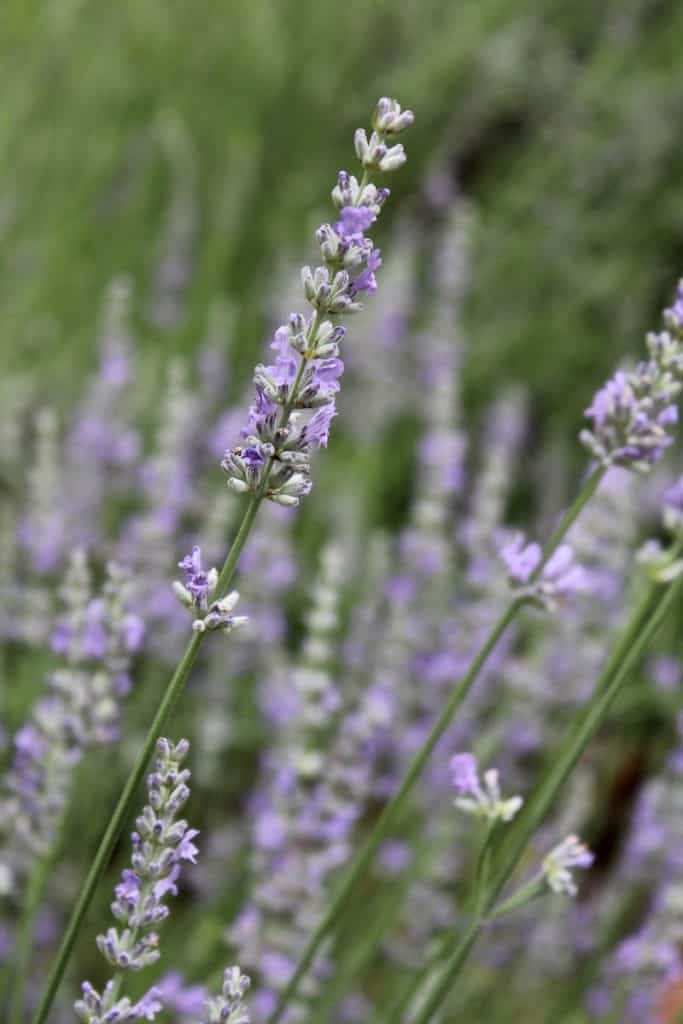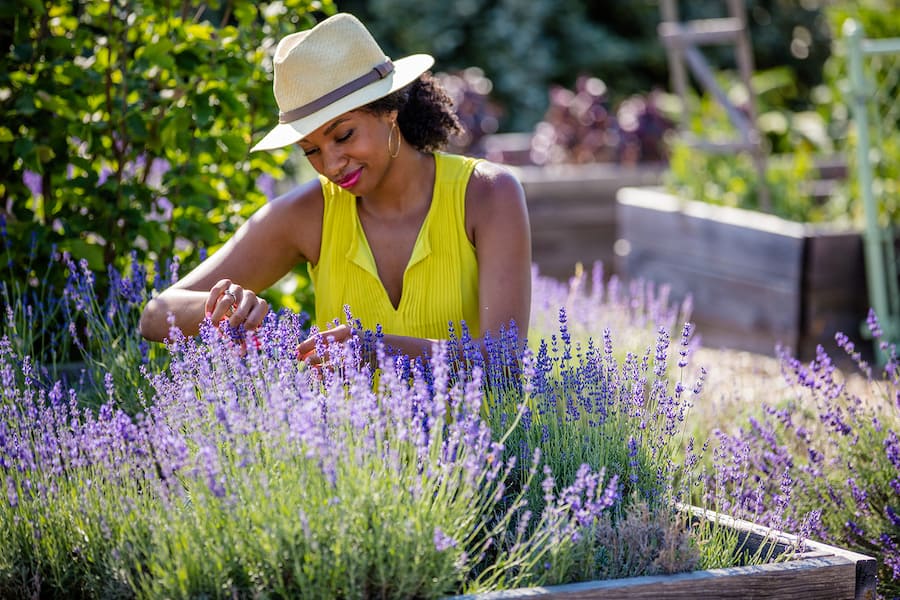As a child, I remember snooping through my mother’s dresser drawers and discovering a little square bag filled with who-knows-what, its opening tightly squeezed closed with a ribbon. The only thing I knew was that it smelled wonderful. It always made me think of her. Today, I still reach for that same kind of wonderful through oils, perfumes, teas, soaps, sachets, baths and even desserts infused with the magical Mediterranean plant.
As far back as the Middle Ages, people discovered the benefits of lavender, keeping rooms fresh and even warding off evil spirits. The Greeks and Romans delighted in its perfume qualities, recognizing its medicinal qualities, too. Lavender, a Mediterranean plant, is extremely difficult to grow in Georgia due to the South’s humidity, rainfall and acidic soil. For those reasons, Georgia lavender fields are scant in our region, but for the two farms that have pushed the limits to produce these purple plants, their fields—and creations—are a feast for the eyes and senses.

RED OAK LAVENDER FARM
2882 Red Oak Flats Road, Dahlonega
When David Duffey realized the extent of his wife Tina’s passion for lavender, he had to make her dream of a farm a reality.
“We had our two acres and thought it would be a beautiful crop to grow with all the beautiful purple flowers and amazing scent,” explains Tina. “At the time, I was not aware of all the benefits of lavender and that you can use all the parts of the plant. The experts told me in 2014 that I could not grow lavender here in Georgia due to our humidity and amount of rainfall.”
However, in the Duffey’s front yard, two Provence lavender plants were thriving. Why not try it on a larger scale?
With her $1,000 budget and lots of research, she planted her first crop of approximately 500 lavender plants of five different varieties in a 90-foot x 100-foot plot in her backyard.
“By August of that year, I was at the farmer’s market with my first bundles,” she says. “In 2016, we had our first lavender festival.” The Duffeys also teach classes on how to grow lavender in the South.
Dealing with the difficulty of growing lavender in Georgia, Tina “learned to grow by adapting our soil, planting in high mounds, and growing test gardens to allow better air flow. All of this comes with a lot of work and high costs with adding amendments to our soil. Lavender needs an arid, rocky soil, and it does not like fertilizers.” They also work with the University of Georgia yearly to discuss growing patterns.
Through lots of trial-and-error, the Duffeys are always testing varieties in order to determine what grows best. “Over the years we have found Grosso, Gros Bleu, Munstead, Provence and Stoechas to be the best,” Tina says. The most difficult? Angustifolia, which is a culinary lavender.
“I chose lavender at first for its intoxicating scent and amazing beauty,” Tina says. “And it’s my Grandma Zora’s favorite color. It is truly one amazing plant that has so many uses from bud to stem. When people see the farm in bloom or walk into our shop seeing the bundles hanging from the ceiling and smelling the amazing lavender true scent, they say ‘wow.’” From antiseptic, antifungal and antidepressant properties to a soothing agent for burns and bee stings, its uses are endless. And Tina noticed that once she planted lavender, the deer “no longer come to our farm.” Within their shop on-site (and online), they sell “harvested dried bundles, dried buds to use in soaps, sachets or potpourri. Duffey says, “We also distill the harvested plant for essential oil which we use to make lotions, salves, shampoo, bath salts and soaps.”
Visit redoaklavender.com for the latest in classes, tours and U-picks.

WHITE HILLS FARM
1419 Fort Creek Road, Dearing
Amy Sutter and her husband Patrick purchased White Hills Farm in 2017. The previous owner had been growing lavender since 2009. Becoming part of the local foods movement in Dearing was important; the farm hosts many community events throughout the year, yet it’s during the Spring and summer when the lavender fields are in full bloom that the lavender lovers come.
“We have around 500 lavender plants on the property,” Amy Sutter explains. “Most of them are the large hybrid variety (X-Intermedia). These plants produce long-stemmed flowers that bloom in June and are harvested and dried June/July. We also have Stoechas (also called Spanish Lavender) and English or culinary lavender (Angustifolia). The Stoechas usually start blooming in March with lots of blooms in the spring, then sporadic blooms in the summer. The English lavender will begin blooming in April but will quit producing in the summer. The hybrid lavender blooms in June, which is a great time to visit White Hills Farm and see all the bees and butterflies on the blooms.”
Sutter also acknowledges the difficulty of growth in Georgia.
“Lavender is not very easy to grow in Georgia, mostly due to our high humidity,” she confirmed. “Lavender is very susceptible to fungus. Last year several of our plants died and testing through the UGA agriculture extension office revealed a root fungus to be the culprit. I’m currently treating all the lavender beds with an organically approved soil drench.”
In the White Hills Farm gift shop, they sell various products including bathing salts and sachets.
“I harvest and dry lavender, rosemary, oregano, thyme, calamint, marjoram and many other herbs for our bath and culinary products,” she says. Although they do not manufacture essential oils, they make “solar-infused oils for body products.” They promote classes and workshops ranging from soap making to cooking to yoga, even cocktail classes that focus on creating unique concoctions infused with lavender and other herbs.
During the lavender and herb season, White Hill Farms is open on Fridays. Visit whitehillsfarm.us for a list of upcoming events and classes.